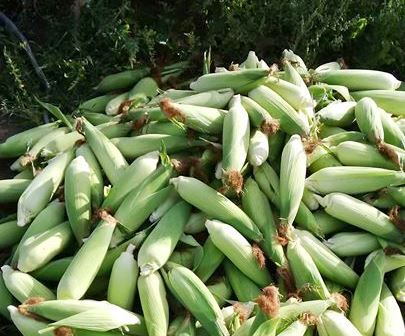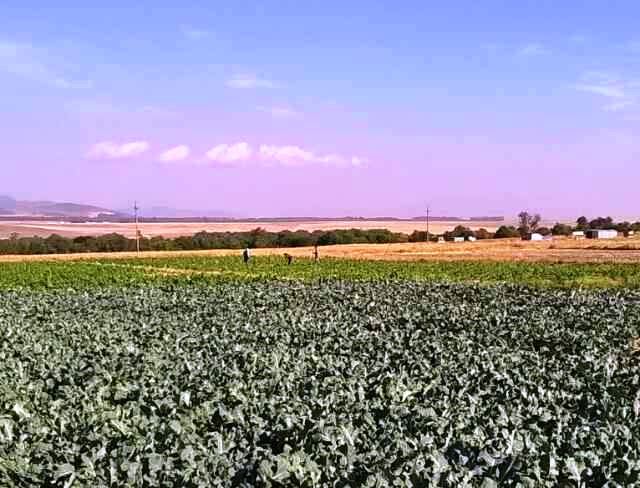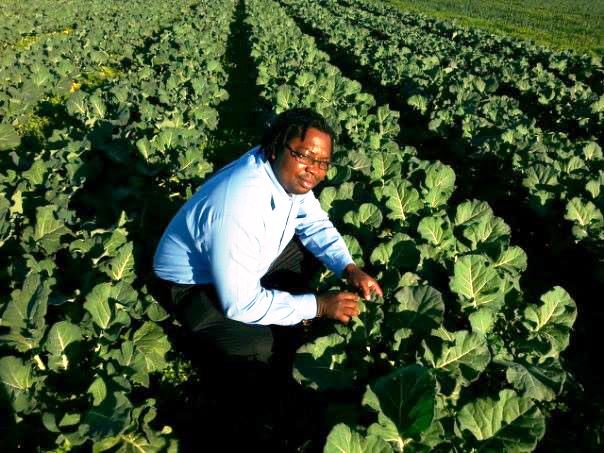Zimbabweans make thriving farm on abandoned land
Land-owner on N7 bet them that it was unprofitable
Five Zimbabwean men have been successfully growing crops on land abandoned as unprofitable in Malmesbury. The landowner, N7 Meat, gave up farming crops on the land, claiming losses of over R1 million.
Zinhanga and four friends met the landowner when buying an ox for slaughter at N7 Meat in 2014. Noticing fallow land, they asked why it was unutilised. The farmer said it was unprofitable and if the Zimbabweans refused to believe him, he said they could try and farm it for free for a year. They could use his farming equipment and only pay for electricity. He bet them they could not make a go of it.
According to one of the Zimbabweans, Albert Zinhanga, a teacher of African languages at Cravenby High School in Parow, the farmer was told it would cost R300,000 to correct the pH of the soil. He didn’t want to invest further and continued concentrating on rearing sheep, cattle and pigs elsewhere on his farm.
Zinhanga has four partners; one does have a doctorate in agriculture, the others have degrees in physics, science and engineering.
“We never dreamt or even thought that one day we will be farmers,” said Zinhanga. “We were just a group of academics driving around buying farm products.”
The five men tested the soil and the water and it seemed good to them, albeit sandy. To counter this, they say they watered continuously before planting any crops. They planted three hectares in all, with tomatoes, cauliflower, broccoli, spinach and maize.
Neighbouring farmers, watching the developments, came to them and gave advice. They also introduced the men to Cape Town Epping Market to sell their produce.

When the maize crop ripened, the surrounding farmers were stunned. They said they had never seen such big stalks, says Zinhanga.
The Zimbabweans say the secret is to use cow dung and not to rely solely on fertiliser.
After the initial success, the farm owner offered them the land at a rental of R1,200 per hectare.
They now farm 15 hectares and have also started growing a leaf vegetable called tsunga. They call themselves the N7 Farmers, but as they all have full time jobs, they work the farm on Saturdays and Sundays and during the week take turns after work. They have six employees. The farm manager is Malawian. Four general workers are South Africans and there is one Zimbabwean. During planting and harvesting time, they hire 20 part-time workers on Saturdays.
Zinhanga and his team were announced winners in the small business of the year award category on 2 April at the Cape Town Zimbabwe Excellence Gala Dinner Awards Ceremony 2016 at Kelvin Grove, Newlands.

Support independent journalism
Donate using Payfast

Next: Once proud PE school is crumbling
Previous: Hundreds of Masiphumelele residents march to court
Letters
Dear Editor
Great to read such positive news of people helping themselves with the correct permission to use another man's land. Farmers are willing to give those who want to work help, using old organic soil enrichment methods with modern day farming. Lovely to read that more people are being employed and maybe little by little we can all help turn our country to what we all really wish it to achieve.
Dear Editor
The Zimbabwean farmers story in Cape Town is actually an eye opener to our SA government.
I am a teacher but I happen to also have passion for agriculture and farming, to be specific.
Some of the SA public sector employees would like to farm but we are faced with so many challenges, for example, access to agricultural land, access to water, etc.
If the deserving SA public servants could be be given access to land, they could assist in bringing the level of unemployment down, in our country. An agreement could be entered into, where employees bind themselves to not to neglect their responsibility and concentrate on the farms. This could be put to test with a minimum of five hectares to each employee.
The government alone is not going to win the fight against the high rate of unemployment.
Dear Editor
It is now our time to shine and rise. As youth we can do things that make our parents proud of us and happy. I'm still young but i want to become a farmer. I need advice from a farmer or a person who has experience about farming.
Dear Editor
What a great story to read. Well done man. And to think how much other fertile land in South Africa is available. Think if we can snowball this success to other parts of our beautiful country ...
DeWaal van Niekerk
© 2016 GroundUp. 
This article is licensed under a Creative Commons Attribution-NoDerivatives 4.0 International License.
You may republish this article, so long as you credit the authors and GroundUp, and do not change the text. Please include a link back to the original article.

